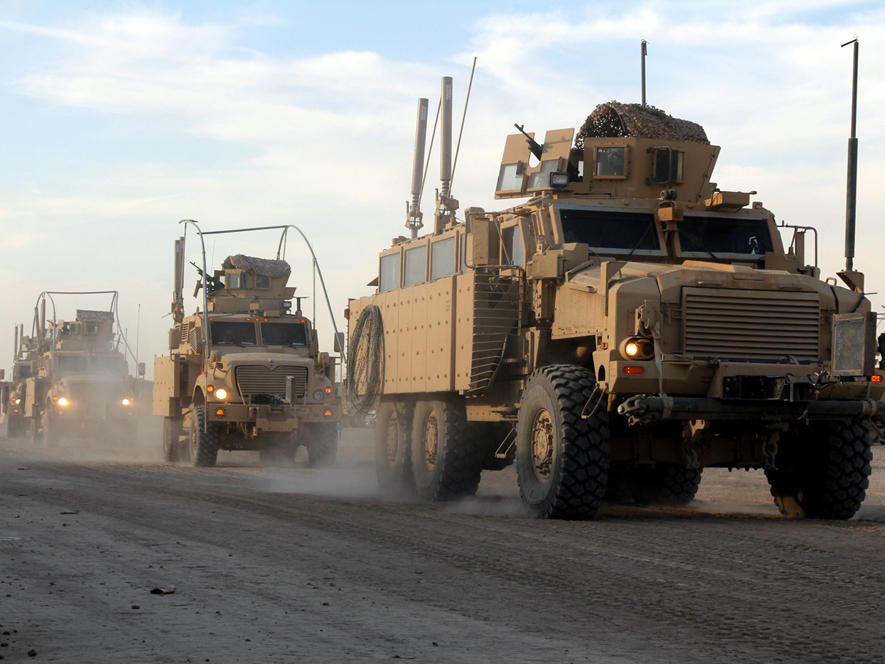Withdrawal from Syria’s Skirmish
A U.S. convoy departs from Contingency Operating Station Kalsu, a U.S. base about 60 miles south of Baghdad. For many U.S. troops, it is the last stop in Iraq on the way out of the country.
After days of conflict and differing statements, the decision to withdraw American forces from Syria has finally gone underway. A U.S. defense official said the movement of equipment is part of what the military calls a “deliberate withdrawal” from Syria, where some 2,000 troops had been working with the coalition of Syrian Kurdish and Arab fighters to defeat the remnants of the Islamic State group.
On January 13, 2019, Trump sent out a tweet vowing to “devastate” the Turkish economy if Ankara, the capital of Turkey, attacked U.S.-backed Kurds. Turkish Foreign Minister Mevlut Cavusoglu reciprocated Trump’s “threatening language” and stated his country was “not to be scared or frightened off. You will not get anywhere by threatening Turkey’s economy.”
U.S troops have been involved in Syria’s war since 2014 when the first elite forces arrived in the country to advise Kurdish-led fighters battling the Islamic State. A U.S. troop pullout will leave the Kurds exposed to Turkish forces on one side and Syrian government troops on the other. The withdrawal benefits Syrian President Bashar Assad and his international backers, Russia and Iran, who are primed to move into the region to fill the vacuum left behind by the departing Americans. As of January 14, the U.S. had already moved military equipment, but not troops, from Syria.
Turkey’s goal is to establish a “safe zone” between Kurdish-controlled territory and the Turkish border. There are major concerns that Turkey’s fight against the Kurds in Syria could turn into a broader war. An assault from Turkish troops could put U.S. troops in harm’s way, especially if they defend their Kurdish allies, who have helped defeat ISIS throughout Syria.
For many months, Turkey has threatened to invade the Kurdish-controlled portion of Syria. Although Turkey has already launched a handful of directed attacks, they have refrained from causing much damage. Once all the U.S. troops and equipment have left, things will almost certainly change. The major role of the United States troops in Syria has been to protect the Kurds, and U.S. withdrawal would unquestionably leave the Kurdish people vulnerable to an attack from Turkey.
The recent withdrawal from Syria means abandoning the Kurdish allies, which would cripple future American efforts to gain the trust of local fighters for counterterrorism operations in Afghanistan, Yemen and Somalia. Many military leaders fear that an abrupt withdrawal will imperil the territorial gains against the Islamic State by the United States and its coalition partners – essentially repeating what happened after President Trump’s predecessor, Barack Obama, pulled troops from Iraq back in 2011.
On Wednesday, January 16, 2019, a suicide bombing in Syria claimed by the Islamic State killed 19 people, including four Americans. According to residents, the attack was targeted at an American military convoy in the northern city of Manbij as troops were inside the Palace for the Princes, a restaurant where they often stopped to eat during patrols. While the four Americans were inside, a suicide attacker wearing an explosive vest blew himself up in front of the building. This recent attack raised many new questions about President Trump’s sudden decision to withdraw American troops from Syria.
The President has long promised to pull American forces out of Syria but also threatened in a Twitter post to hit the Islamic State “hard” if the group lashed out. Now, the Islamic State has attacked American troops and confusion has arisen as to what Trump’s next move might be. Representative Michael McCaul of Texas says, “I strongly urge the president to forcefully respond and ensure we do not withdraw our troops until ISIS is completely destroyed.”
All in all, whether or not a U.S. withdrawal should occur is the single most important question in the Syrian conflict. Leaving the Kurds to hold their own could possibly eliminate America’s future hopes of foreign assistance. Removing U.S. troops is final and cannot be undone. Once we leave the war the United States has say in future events or negotiations reagrding the middle east. Staying in Turkey would assure the safety of the Kurdish people, but would constantly be threatening to Turkey. President Trump’s decision to leave Syria could perhaps prompt a new round of retaliation from Turkey or even the start of a new war.






